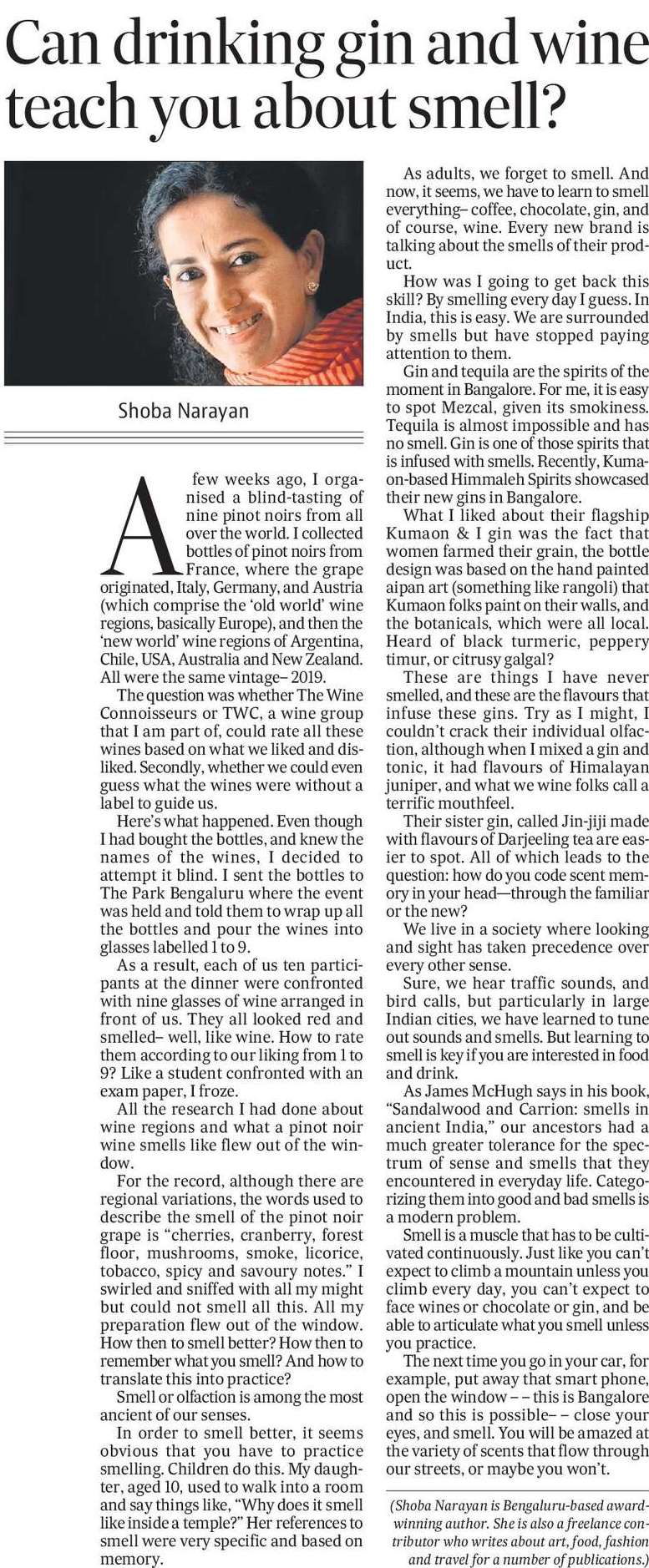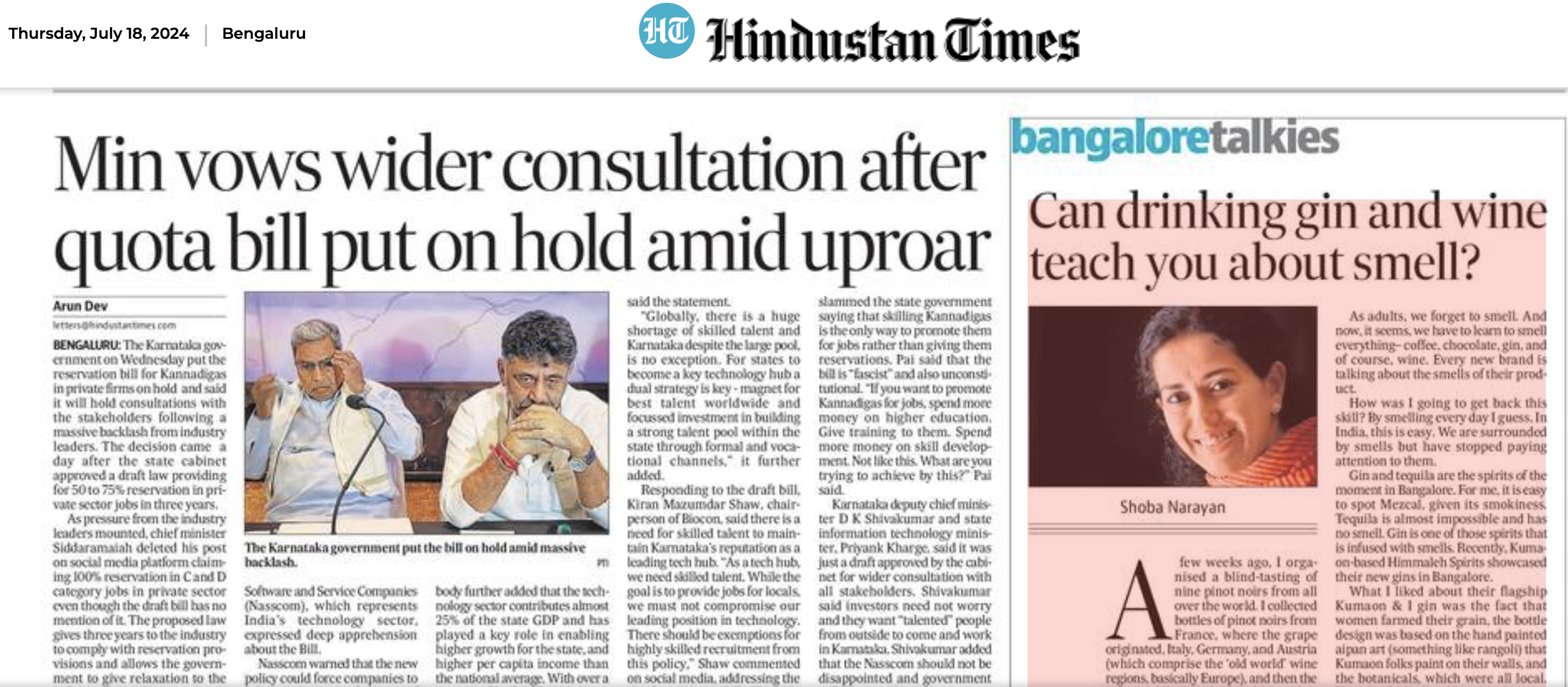A few weeks ago, I organised a blind-tasting of nine pinot noirs from all over the world. I collected bottles of pinot noirs from France, where the grape originated, Italy, Germany, and Austria (which comprise the ‘old world’ wine regions, basically Europe), and then the ‘new world’ wine regions of Argentina, Chile, USA, Australia and New Zealand. All were the same vintage– 2019. The question was whether The Wine Connoisseurs or TWC, a wine group that I am part of, could rate all these wines based on what we liked and disliked. Secondly, whether we could even guess what the wines were without a label to guide us.
Here’s what happened. Even though I had bought the bottles, and knew the names of the wines, I decided to attempt it blind. I sent the bottles to The Park Bengaluru where the event was held and told them to wrap up all the bottles and pour the wines into glasses labelled 1 to 9. As a result, each of us ten participants at the dinner were confronted with nine glasses of wine arranged in front of us. They all looked red and smelled– well, like wine. How to rate them according to our liking from 1 to 9? Like a student confronted with an exam paper, I froze. All the research I had done about wine regions and what a pinot noir wine smells like flew out of the window. For the record, although there are regional variations, the words used to describe the smell of the pinot noir grape is “cherries, cranberry, forest floor, mushrooms, smoke, licorice, tobacco, spicy and savoury notes.” I swirled and sniffed with all my might but could not smell all this. All my preparation flew out of the window. How then to smell better? How then to remember what you smell? And how to translate this into practice?
Smell or olfaction is among the most ancient of our senses. In order to smell better, it seems obvious that you have to practice smelling. Children do this. My daughter, aged 10, used to walk into a room and say things like, “Why does it smell like inside a temple?” Her references to smell were very specific and based on memory. As adults, we forget to smell. And now, it seems, we have to learn to smell everything– coffee, chocolate, gin, and of course, wine. Every new brand is talking about the smells of their product. How was I going to get back this skill? By smelling every day I guess. In India, this is easy. We are surrounded by smells but have stopped paying attention to them.
Gin and tequila are the spirits of the moment in Bangalore. For me, it is easy to spot Mezcal, given its smokiness. Tequila is almost impossible and has no smell. Gin is one of those spirits that is infused with smells. Recently, Kumaon-based Himmaleh Spirits showcased their new gins in Bangalore. What I liked about their flagship Kumaon & I gin was the fact that women farmed their grain, the bottle design was based on the hand painted aipan art (something like rangoli) that Kumaon folks paint on their walls, and the botanicals, which were all local. Heard of black turmeric, peppery timur, or citrusy galgal? These are things I have never smelled, and these are the flavours that infuse these gins. Try as I might, I couldn’t crack their individual olfaction, although when I mixed a gin and tonic, it had flavours of Himalayan juniper, and what we wine folks call a terrific mouthfeel. Their sister gin, called Jin-jiji made with flavours of Darjeeling tea are easier to spot. All of which leads to the question: how do you code scent memory in your head—through the familiar or the new?
We live in a society where looking and sight has taken precedence over every other sense. Sure, we hear traffic sounds, and bird calls, but particularly in large Indian cities, we have learned to tune out sounds and smells. But learning to smell is key if you are interested in food and drink. As James McHugh says in his book, “Sandalwood and Carrion: smells in ancient India,” our ancestors had a much greater tolerance for the spectrum of sense and smells that they encountered in everyday life. Categorizing them into good and bad smells is a modern problem.
Smell is a muscle that has to be cultivated continuously. Just like you can’t expect to climb a mountain unless you climb every day, you can’t expect to face wines or chocolate or gin, and be able to articulate what you smell unless you practice. The next time you go in your car, for example, put away that smart phone, open the window – – this is Bangalore and so this is possible– – close your eyes, and smell. You will be amazed at the variety of scents that flow through our streets, or maybe you won’t.
Shoba Narayan is Bangalore-based award-winning author. She is also a freelance contributor who writes about art, food, fashion and travel for a number of publications.



-k4lD-U204025897261YmH-250x250%40HT-Web.jpg)




Amazing , it was as if I was reading my old diary. Loved the simplicity of expression and honesty in experience. Keep it up Shobha!